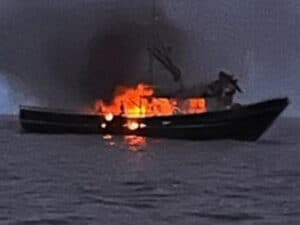
Tanker that hit box ship in Houston ship channel was trying to avoid fuel barge
Written by The National Transportation Safety Board has issued a preliminary report that says a chemical tanker that hit a containership in the Houston ship channel last month was trying to avoid a fuel barge and towboat.
The National Transportation Safety Board has issued a preliminary report that says a chemical tanker that hit a containership in the Houston ship channel last month was trying to avoid a fuel barge and towboat.
Following is taken from the NTSB preliminary report.
At 0906 central daylight time (CDT) on Saturday, October 29, 2011, the 799-foot Greek-flag chemical tanker Elka Apollon, outbound in the Houston ship channel, collided with the 777-foot inbound Panamanian-flag container vessel MSC Nederland at a point in the channel referred to as Five Mile, which is close to the channel’s intersection with the Bayport ship channel.
Prior to the collision, the pilots agreed via VHF radio to a port-to-port passing. As the Elka Apollon began its maneuver to meet the MSC Nederland, the towboat Mr. Earl pushing a fuel barge was exiting the Bayport ship channel off the tanker’s starboard side. The pilot on the Elka Apollon issued commands to avoid the towboat and barge with left rudder orders and in so doing set the tanker on a heading across and to the left in the channel. The pilot on the tanker tried to regain control of the vessel with a hard starboard rudder order in an effort to avoid the inbound MSC Nederland. The pilot on the MSC Nederland saw the approaching tanker and ordered emergency full ahead and hard to port to try to swing his vessel away from the tanker’s bow. In spite of the efforts of both pilots, the two vessels collided.
The Elka Apollon had arrived in the port of Houston four days earlier on October 25 to discharge cargo. The ship was operated by European Product Carriers, Ltd.; had a crew of 24; and was under way for Freeport, Texas, with 342,000 barrels of naptha [1] onboard when the collision occurred. It left the dock at Houston’s Oil Tanking terminal at 0700 CDT with two pilots on board for the outbound transit.
The MSC Nederland, operated by Mediterranean Shipping Company (MSC), had a crew complement of 23. It departed from Altamira, Mexico, with about 1,025 containers aboard; arrived at about 0645 on October 29; and boarded a pilot at the sea buoy for the transit up the Houston ship channel. The vessel was bound for the Bayport Container Terminal located in the Bayport ship channel for discharge of its cargo of containers.
As a result of the collision, the Elka Apollon sustained damage to its port bow area and the MSC Nederland to its port side at the main deck level in the vicinity of its superstructure. In addition to the vessel’s hull damage, three containers from the MSC Nederland fell onto the forward deck of the Elka Apollon as a result of the impact. The containership’s rescue boat, situated on the vessel in way of the impact area, was released from its secured position and set adrift during the accident. Damage assessments are pending.
The National Transportation Safety Board (NTSB) launched a team of investigators to the accident scene the morning of October 30. The U.S. Coast Guard was the lead investigative agency for the accident. Investigators retrieved and reviewed the voyage data recorders from both vessels involved in the accident as well as recorded data from the Coast Guard Sector Houston – Galveston Command Center and Vessel Traffic Service (VTS). The data from the electronic charting system on the towboat Mr. Earl also was obtained. While on scene, investigators interviewed crew members from both ships, the crew of the Mr. Earl, Houston’s Coast Guard VTS watchstanders, Coast Guard Command Center watchstanders, and the three pilots aboard the ships at the time of the collision.
The team completed the on-scene portion of its investigation on November 8. No injuries were reported, and no pollution resulted from the collision. Drug and alcohol testing was performed on relevant crew members of both vessels, the watchstanders at the port’s VTS station, and the three pilots on board the two ships involved. Those results are pending.
November 16, 2011





Leave a Reply
You must be logged in to post a comment.